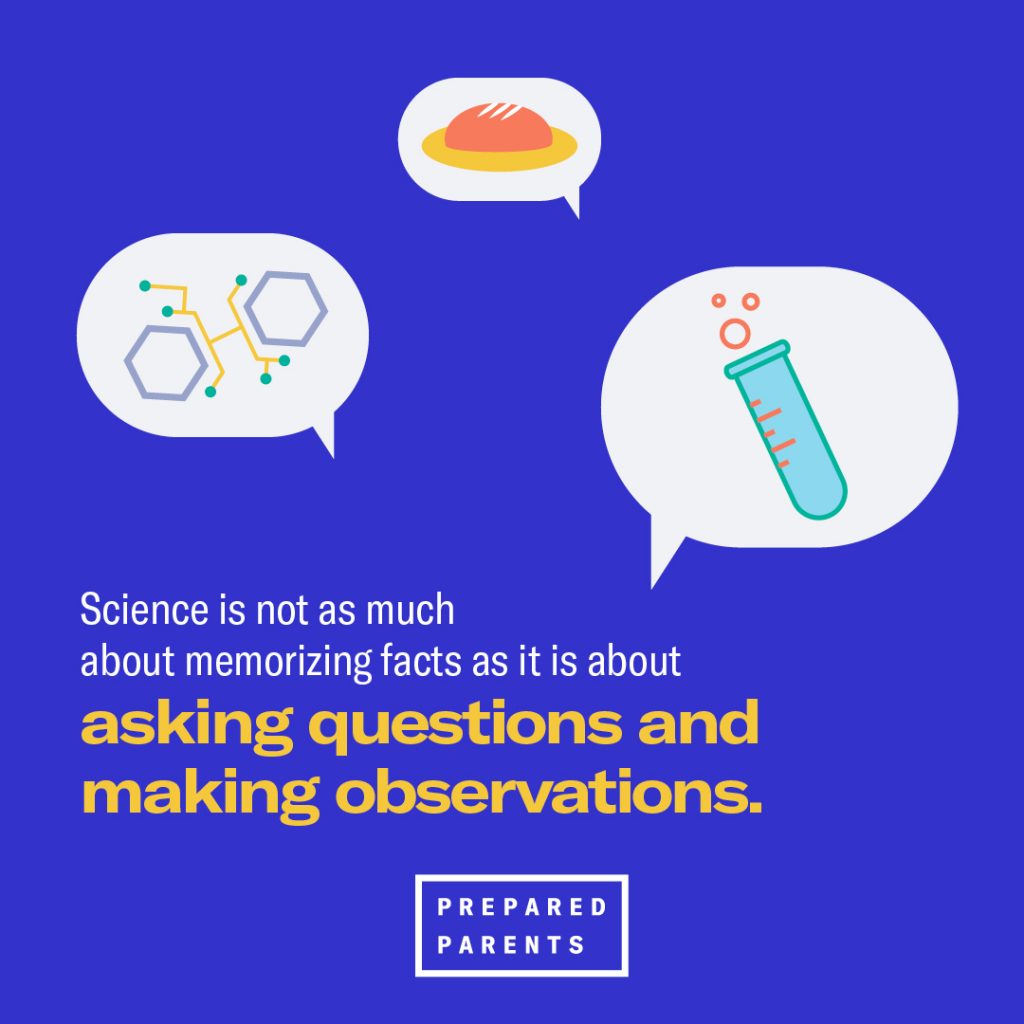Just about every scientific discovery started with a curious person asking a question. From Sir Isaac Newton wondering what caused an apple to fall from a tree to Anika Chebrolu, the fourteen year old winner of the 2020 3M Young Scientist Challenge, who discovered a potential therapy for COVID-19 as she tried to figure out why so many people die every year from the flu.
“Children are born scientists. They’re always turning over rocks and plucking petals off of flowers. They’re always doing things that by and large are destructive. That’s what exploration is. You take stuff apart, whether or not you know how to put it back together. This is what kids do. An adult scientist is a kid who never grew up.”
— Neil deGrasse Tyson, Astrophysicist
“Science is not as much about memorizing facts as it is about asking questions and making observations,” says Prepared UNBOXED Guest Master Teacher, Aidan O’Dowd-Ryan, who designed the curriculum for the UNBOXED project, The Science of Bread. He developed the bread-baking project for kids in grades 4–9 as a hands-on experiment that gets them to think differently about something they encounter everyday. Science is in the everyday. Any time a kid asks how, why, or what if, they’re engaging in science.
“For me science is about how we go about answering questions. I bet most of the students doing this project never really thought about what goes into making bread—why it looks, tastes, or feels the way it does. At the very least they’ll learn why bread has holes in it and maybe that will lead them to wonder about the bread they buy that has tinier holes. Does the amount of yeast have something to do with that? It’s a win if this experiment gets kids to start asking questions.”
-Aidan O’Dowd-Ryan
Prepared UNBOXED Guest Master Teacher
Any kid who asks a question is a scientist. “Every single question that gets asked in my class has some value,” says Aidan, who teaches Honors Biology and AP Environmental Science at Walter Payton College Preparatory High School in Chicago. “The best thing I can do for my students is push them to try to find answers on their own. That can be really powerful.”
Teachers like Aidan find that this type of inquiry-based learning is effective because it’s student-activated. Kids want to satisfy their curiosity and will come up with questions they really want answered. It’s a way to encourage them to use their imagination to figure out how to learn more. And it encourages intrinsic motivation. Kids who are intrinsically motivated engage in a behavior because it’s personally rewarding. They like doing it. Intrinsic motivation encourages self-determination, the ability to make choices and manage their own life, and it may yield longer-lasting results.
The approach Aidan recommends is the scientific method, a technique used in the construction and testing of a scientific hypothesis. This process teaches kids how to think, learn, solve problems and make informed decisions and includes:
- Making observations
- Asking questions about the observations
- Gathering information
- Forming a hypothesis
- Testing the hypothesis
- Analyzing data and drawing conclusions
“I want kids to be scientific in the way they approach a problem. If the TV isn’t working, I tell them to figure out why in a scientific way. Design some way to test an answer and then do it. If that doesn’t work, try something else. It’s an iterative process.”
-Aidan O’Dowd-Ryan
Prepared UNBOXED Guest Master Teacher
Aidan is not disappointed when an experiment fails; “I don’t care if a student finishes an experiment and doesn’t get the result they want. Failure only happens when the student decides they’ve given up and they’re not going to try again.”
Kids who persevere demonstrate several behaviors:
- They refuse to give up in the pursuit of a goal, even when it’s difficult.
- They see failure as a positive learning experience they can use in future endeavors.
- They choose to learn from their mistakes.
- They don’t make excuses or blame others for failure.
- They believe in themselves and are willing to keep trying.
“If your experiment fails, let’s not just throw it away. Learn from the process. Do some tests. Answer some questions. There’s good science in bad data.”
-Aidan O’Dowd-Ryan
Prepared UNBOXED Guest Master Teacher
A growth mindset encourages a kid to accept challenges, sustain effort, and try new strategies. It’s something emphasized in The Science of Bread because kids need to practice to get good at baking. Even Aidan who started bread-making long before it became a pandemic pastime says, “You’re not going to get the results you want if you don’t practice. And that’s what I want students to take away. In bread baking and in science, if you keep practicing, you’ll be better in a year than you are today.”


